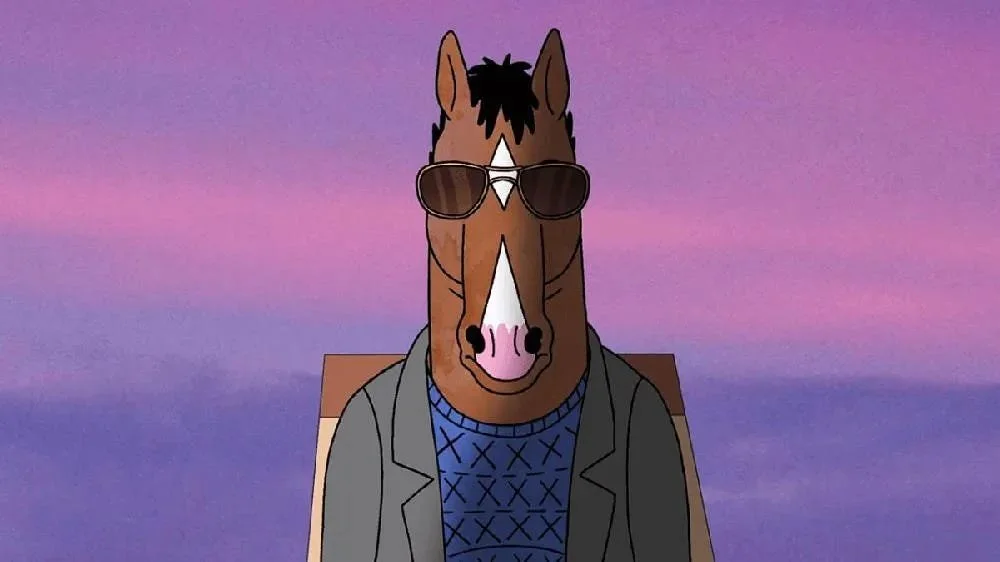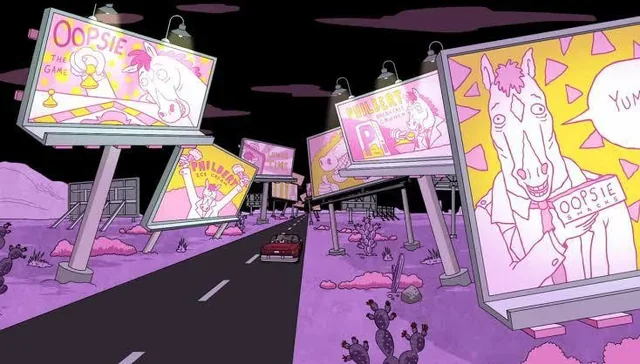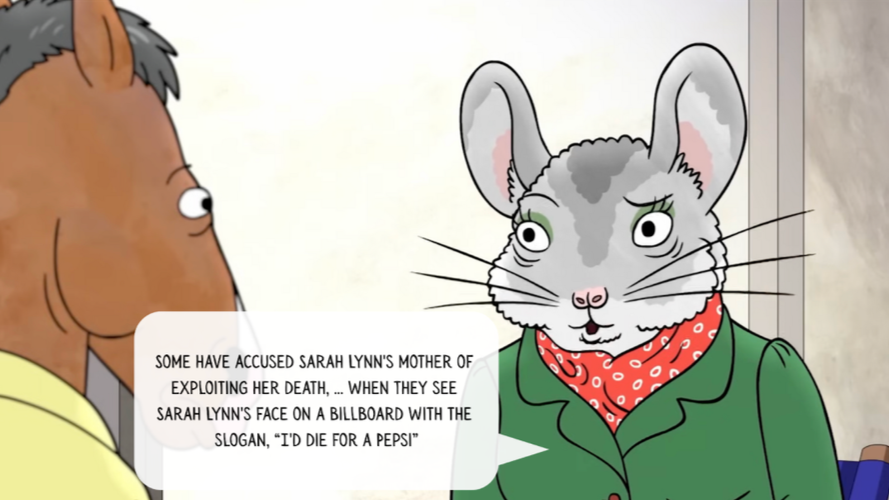How does the TV show “Bojack Horseman” portray capitalism in our society? (Part 1)
Bob-Waksberg’s phenomenal tragicomedy television series “BoJack Horseman” premiered in 2014 and offers a unique perspective on politics, pop culture, and society. Underneath the self-deprecating, existentialist, yet quite humorous premise lie many messages the creators of the show wanted to deliver to the audience and, arguably, did so successfully. One of them includes capitalism. Undeniably, it affects every civilised person, whether they belong to the working class in their 40s or they have just started navigating life in their 20s. The show’s characters adopt different habits and personality traits, navigate various challenges, and gain life-changing experiences, which makes them so relatable to the audience. But what message about capitalism are the creators conveying through these characters?
BOJACK, SARAH LYNN AND HOLLYWOOD
In the show, Hollywood and the entertainment industry play a crucial role in most of its characters’ lives, especially those of BoJack and his former co-star, Sarah Lynn. Today, the big five studios in Hollywood (Universal, Paramount, Warner Brothers, Disney, and Sony) control a substantial share of the industry. It is nearly impossible for any film to succeed internationally without being distributed by one of these five companies. And, the show “BoJack Horseman” addresses this directly when Princess Caroline struggles to start her own agency: “Soon, I'll get some offer from one of the big five agencies that I can't say no to, and I'll go back to being another cog in the giant Play-Doh Spaghetti Maker that is this industry.”
One thing that is also clear in the show is how this industry profits off of personas and the celebrity culture. The entire season-long event of the Oscars showcases how millions of people obsess, worship, and fawn over the celebrities who simply do their jobs (just in a more public space). The celebrity culture produces a giant monetary output in various ways: the news outlets that provide information about the celebrities, the large amount of merchandise created depicting the celebrity or a character they portray, creating a huge market for commodities like mugs, t-shirts, bottles, etc. We can see this through BoJack’s case of starring as the main character of “Secreteriat” and “Philbert”–even a separate team of people is hired to ensure his persona is being promoted enough by organizing lots of interviews, managing invitations to public events with paparazzi, and shooting adverts.
This all leads to the names and personas of these celebrities becoming common goods in these industries, as they strip away the actors’ humanity for companies’ benefits. The show highlights the detrimental effects of these people being used as products. In BoJack's case, it makes them feel as if they have no worth besides what they do in the public eye, as BoJack, across the seasons, constantly tries to find a project that will fulfill him and prove to himself that he is worth something. A lot of this is indeed attached to his childhood spent with his neglective and emotionally abusive parents, however, Hollywood instinctively uses that exact need for love and attention in order to profit from it – just like how capitalism by itself convinces people that their value only lies in our career by fundamentally diminishing those who cannot work or not accommodating those with special needs, as they cannot bring these big corporations money.
Being heavily flawed by capitalism, the industry’s leaders are shown as ones who do not give a second thought to actors’ exploitation, because they are not actual people in conglomerates’ eyes, they are products that can be promoted or thrown in the backroom whenever necessary. Such practice also leads to the abuse of children in an effort to appeal to a wider audience for higher revenue, exposing them to brutal themes at the expense of their mental and physical well-being. These children are used to tell stories that most parents would not let their own children anywhere near, while some parents take advantage of their child's need for attention and praise to be able to make a quick buck.
“BoJack Horseman” suggests that the entertainment industry has basically subverted child labor laws, as highlighted by Sarah Lynn’s own words: “You know, it's amazing that it's legal for kids to be actors. How is that not child labor? I didn't know what I was signing up for. I was three.” Oftentimes, when children are sold as cute and lovable people, they are cast away when they grow up and lose that adorable factor, as Hollywood sees it. We see this blatantly through Sarah Lynn's journey on the show. The young girl who wanted to be an architect was forced into a child acting career by her own mother. And, when she could not rely on her ‘cuteness’ anymore, she relied on her good looks and sex appeal. Eventually, when Hollywood no longer found her profitable, she was completely thrown away, bringing her substance abuse issues (that also stemmed from her exposure to this industry) to the surface.
Discarded by society—abandoned by the fans, managers, and producers who once built her entire life—Sarah Lynn ultimately dies of an overdose, only for the media to feign sudden concern before quickly capitalizing on her death. In Season 4, Episode 2, BoJack watches a miniseries about her life and final days. In one scene, a doctor confirms her death, remarking, “This was bound to happen. That’s just show business.” This moment encapsulates the industry’s ruthless cycle: using performers until they are broken, then repackaging their suffering as entertainment.
She is still being used and commercialized by her mother and this industry, even after she has passed.
These devastating consequences of a system that prioritises profit over people are also shown through Joseph Sugarman (BoJack’s grandfather), who willingly offers up his children as part of a business deal. As his daughter asks, “Father, do you aim to marry me off to Corbin Creamerman merely because it would be good for business?” To which we hear the reply: “Well, I suppose I do have a few ideas of how a Sugarman-Creamerman alliance might be advantageous.” Some parents are simply marrying their own children off to, once again, improve their own selfish financial interests. This shows that this problem does not only exist within Hollywood, but rather Hollywood has a scale of visibility that allows more people to witness and normalise the exploitation of individuals for profit, reinforcing a broader capitalist drive to measure human worth by its marketability.
However, this is just one layer of “BoJack Horseman”’s exploitation of capitalism. There is still much more to unravel – See Part 2!
Article written by Darina Iminova | Proofread by Zhangir Zhangaskin


